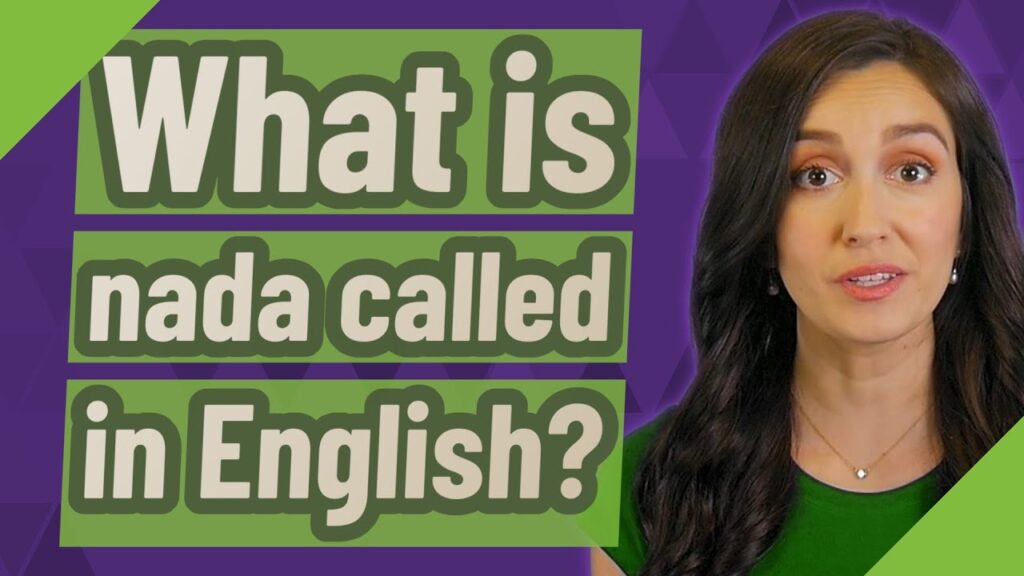Nada meaning “nothing”
In this context, nada is used as a pronoun and it means “nothing”. This is fairly simple for English speakers to understand and it’s easy to use in a sentence. For example: No hay nada en la nevera.
in the same way Is Nada masculine or feminine? The noun la nada means “nothingness”; normally nada is just a word on its own that’s exempt from gender, but as a normal noun its gender is feminine.
Does De nada mean in Spanish? “De nada” means (literally) that there’s nothing to be thankful about. “No hay nada que agradecer”. It’s semantically similar to “not at all”, but it can also be correctly translated to “You’re welcome”.
Can Nada mean anything? Nada means “nothing.” The kids next door will be disappointed if they learn that their lemonade stand has earned them nada. The noun nada is an informal way to say “zero.” If you ask a deli worker how many plain bagels he has, and he answers, “Nada,” it means they’re out of your favorite kind.
What means mucho gusto?
Mucho Gusto Pronounced: Moo-cho Goo-stow. This phrase means “nice to meet you.” It is obviously used when you’re meeting someone for the first time. It can be used in the beginning and the end of the conversation.
Beside this What is De Dónde Eres?
– Saying where you’re from in Spanish – Coffee Break Spanish To Go Episode 1.03.
Do you say okay in Spanish? (= I agree) ¡vale! OK, OK! ¡vale, vale! ⧫ ¡ya, ya!
How do you say por nada?
How do you reply to de nada?
You may say ‘Gracias or muchas gracias” before ‘de nada’ and “ MUCHO GUSTO”, after ‘de nada’. In Mexico de nada is the standard reply to “Thank you” and nothing more is said. It is equal in function to “You’re welcome.”
Does De nada mean you’re welcome in Spanish? The best known, globally accepted way of saying “you’re welcome” in Spanish is “de nada,” but there are actually many different phrases used to express the same sentiment. Some of these phrases are not common in all Spanish-speaking countries, but most will still convey the appropriate meaning.
How many types of Nada are there?
There are two types of Nada-Ahat Nada and Anahat Nada.
What is no called in Spanish? Nop – Nope. To say “no” in Spanish in a super informal way, use this expression. It works the same way as the English “nope” but once again, make it a short /o/ instead of the English diphthong.
What’s another word for nada?
In this page you can discover 16 synonyms, antonyms, idiomatic expressions, and related words for nada, like: nil, naught, nothing, nix, null, aught, cipher, cypher, goose-egg, zero and zilch.
What is muy bueno?
Into English (US)
very good. very good.
What is Muchas gracias? Filters. (Spanglish, US) Eye dialect spelling of muchas gracias.: thank you very much.
What does hasta luego mean in English? Definition of hasta luego
: until later : see you later.
What is soy de mean?
It means “I am from” as far as its use. Whenever someone asks where the other is from, they respond with “Yo soy de”
How do you answer Como te llamas? Cómo te llamas is answered with Yo me llamo… or Me llamo… [given name].
What is bueno Spanish?
interjection Spanish. good; all right.
What does GX mean in Spanish? “GX” translation into Spanish
go. gm. ox. ax. ex.
How do you say alright in Spanish slang?
- Guay. Guay is Spanish slang that normally refers to something or someone cool, and can even go as far as amazing. …
- Vale. A commonly used agreement word, similar to “ok” or “alright”. …
- Venga. …
- Hombre. …
- No pasa nada. …
- Puente. …
- Tío or Tía. …
- Guiri.
Is De nada rude? De nada is usually used as a polite answer after Gracias. On the other side Por nada is used when you were working on something and you didn’t have a result, so you were working for nothing. In my opinion, Por nada would be then impolite answer after Gracias! Por nada = For nothing.
What’s another way to say de nada?
In english we have a multitude of these; no problem, my pleasure, don’t mention it, and my favorite no worries, to just mention a few.
How do you say you’re welcome in Argentina? “De nada” – “You are welcome” or “It was nothing” (directly translated) “Noo, por favor” – “No, please”
Do’t forget to share this post !
